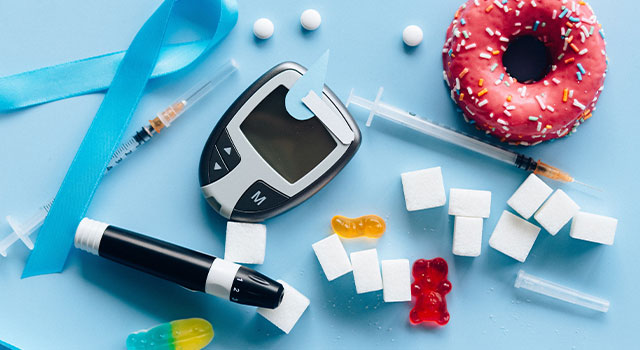 Diabetes is a disease caused by the body’s inability to use or produce insulin. Insulin is the hormone responsible for taking sugar out of the blood and placing it into cells, where it is used to create energy. When the body can’t use or produce sufficient insulin, it causes sugar levels to rise too high.
Diabetes is a disease caused by the body’s inability to use or produce insulin. Insulin is the hormone responsible for taking sugar out of the blood and placing it into cells, where it is used to create energy. When the body can’t use or produce sufficient insulin, it causes sugar levels to rise too high.
A common complication for people with diabetes is diabetic eye disease, a group of sight-threatening eye problems. Glaucoma is one of these diseases.
In fact, having diabetes doubles your risk of developing glaucoma
Glaucoma is one of the most common causes of blindness worldwide. It is caused by pressure build-up within the eye, which leads to permanent damage to the retina and the optic nerve.
If you have diabetes, it’s important to manage your condition in order to preserve your eyesight.
How Diabetes Affects Your Eyes
Diabetes affects your body’s ability to maintain normal blood sugar levels. If your blood sugar rises too high, it can place stress on major organs, including your eyes and kidneys.
The vast majority of glaucoma cases present no symptoms until irreversible vision loss has occurred. Fortunately, your eye doctor can detect sight-threatening eye diseases early on by examining the retina and optic nerve. Left untreated, glaucoma can seriously impair your vision, or leave you partially or completely blind.
Importance of an Eye Exam
To limit the impact of diabetes on your vision, schedule regular visits to your eye doctor. This will enable your eye doctor to assess your eyes and diagnose any diabetes-related vision problems as early as possible. This can improve your chances of preventing or slowing the progression of glaucoma significantly.
If you have diabetes and are concerned about potential risks to your vision, contact Madison Eyes to schedule an appointment. We can help preserve your vision before it’s too late.
Madison Eyes serves patients from Madison, Chatham, Morristown and Summit, New Jersey and surrounding communities.
Q&A
Q: Is there a cure for glaucoma?
- A: There is no cure for glaucoma. However, with early diagnosis and proper treatment, the risks of vision loss can be significantly reduced. That’s why routine comprehensive eye exams are so important.
Q: What glaucoma treatments are currently available?
- A: Your eye doctor will most likely prescribe glaucoma eye drop medications that reduce intraocular pressure. If the eye drops don't work, laser or eye surgery may be the next step. Depending on the advancement of your glaucoma, surgery might be the first option for glaucoma treatment.

